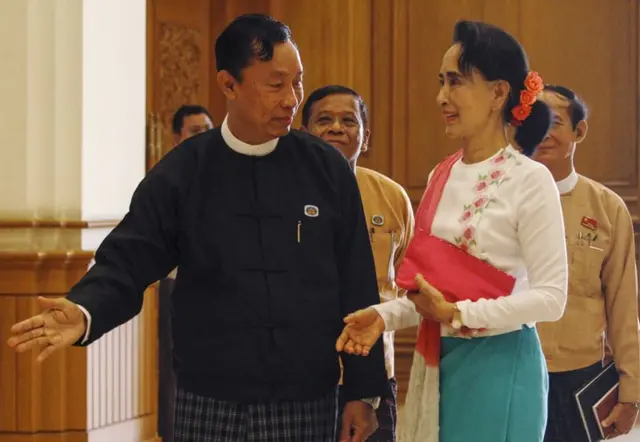Myanmar is seeking a new approach in its peace process by reforming the former Myanmar Peace Center with a new National Reconciliation and Peace Center (NRPC).
At a coordination meeting chaired by State Counselor Aung San Suu Kyi on Monday, representatives of the government, military and the Peace Center agreed to work for the formation of the NRPC and a 21st-century ethnic conference akin to the historic Pinlong Conference in 1947.
Suu Kyi urged inclusion of all stakeholders who should be involved in every step of national reconciliation and peace process.
She called for holding the ethnic conference within the next two months at the Joint Monitoring Committee (JMC) for ceasefire in Nay Pyi Taw after the new government took office on April 1.
In January, Myanmar's previous government convened the first Union Peace Conference in the capital, the biggest gathering of political forces in the country in over six decades, involving hundreds of representatives from stakeholder groups of the government, parliament, military and eight ethnic armed groups, who signed the National Ceasefire Agreement (NCA).
The peace process establishment and negotiated points at the last union peace conference were to be handed over to the new government.
Dealing with the internal peace process, Suu Kyi has highly appreciated the previous government's ceasefire initiative, calling for continued efforts to include in the ceasefire accord those organizations deemed appropriate for inclusion.
Myanmar's government and eight ethnic armed groups out of 15 signed the NCA on Oct. 15, 2015. After that a union-level Joint Ceasefire Monitoring Committee (JCMC) was formed along with a tripartite Union Peace Dialogue Joint Committee (UPDJC) tasked with drafting a framework for holding political dialogue as part of the implementation of the NCA.
Under the NCA, the two sides agreed on some post-ceasefire steps and the unfinished peace process includes bringing in seven other ethnic armed groups that have not signed the ceasefire accord to complete the truce signing process.
However, in November fighting erupted between two armed groups -- Restoration Council of Shan State (RCSS) or Shan State Army-South (SSA-S), led by Ywet Sit, and Taaung National Liberation Army (TNLA), in Namhkam township and the clashes intensified in mid-February, forcing nearly 4,000 people to flee the area.
In the wake of the clashes, a proposal was then submitted to the parliamentary House of Representatives (Lower House), urging an end to conflict in Shan state's northern Palaung autonomous zone and Kyaukme as soon as possible.
Myanmar's House of Nationalities (Upper House) also agreed to debate on a motion in early May to end the fighting in the western Rakhine state between the military and the ethnic Arakan Army (AA).
The motion, which was approved in the House, also called for bringing the AA into political dialogue.
The AA is among those groups not included in the NCA deal signed between the government and eight ethnic armed groups.
Meanwhile, the JMC for Cease fire has re-appointed Tin Myo Win, personal doctor of State Counselor Aung San Suu Kyi, as new peace mediator who pledged all-inclusive peace efforts to bring about a lasting peace in the country. Enditem
 简体中文
简体中文

